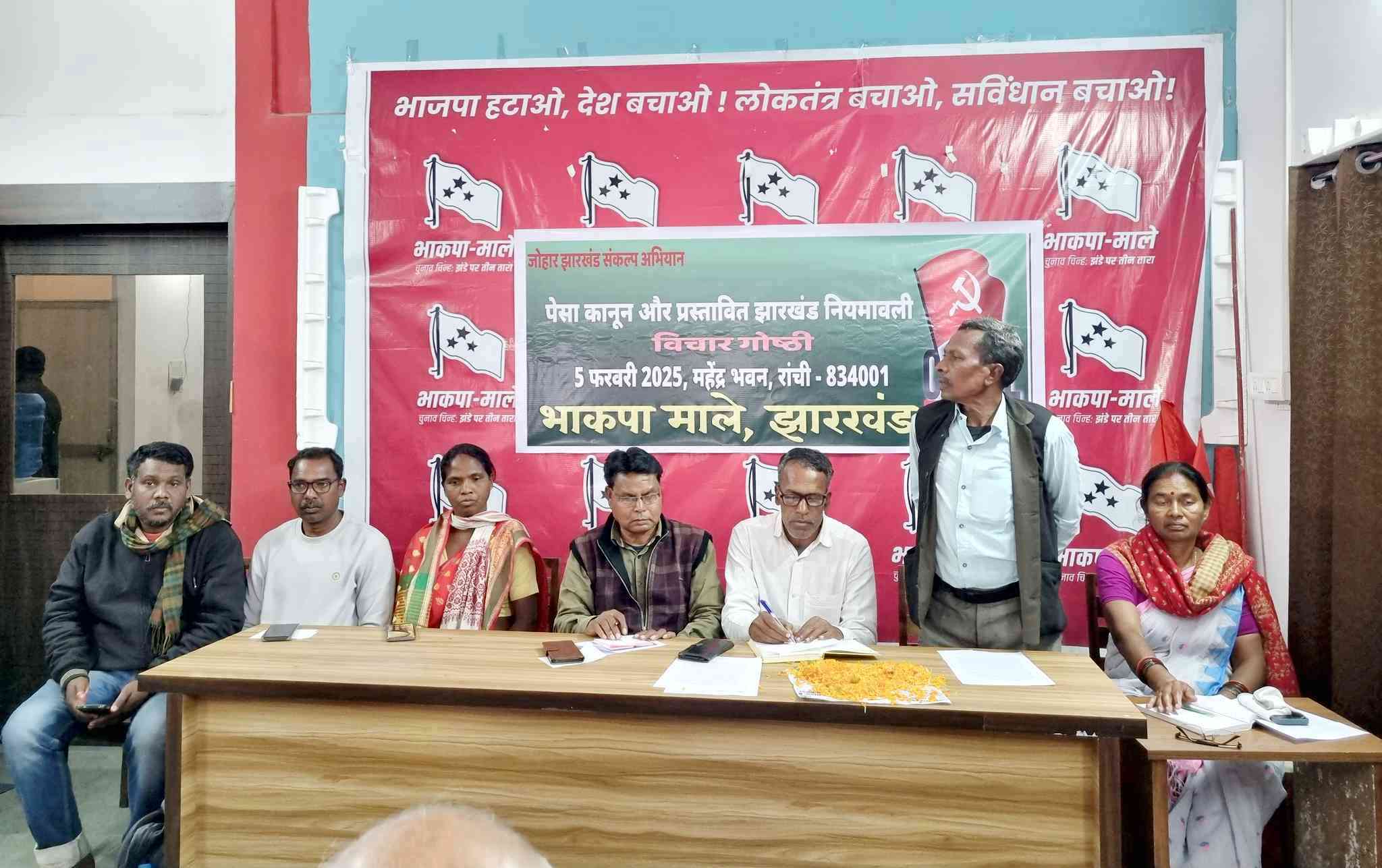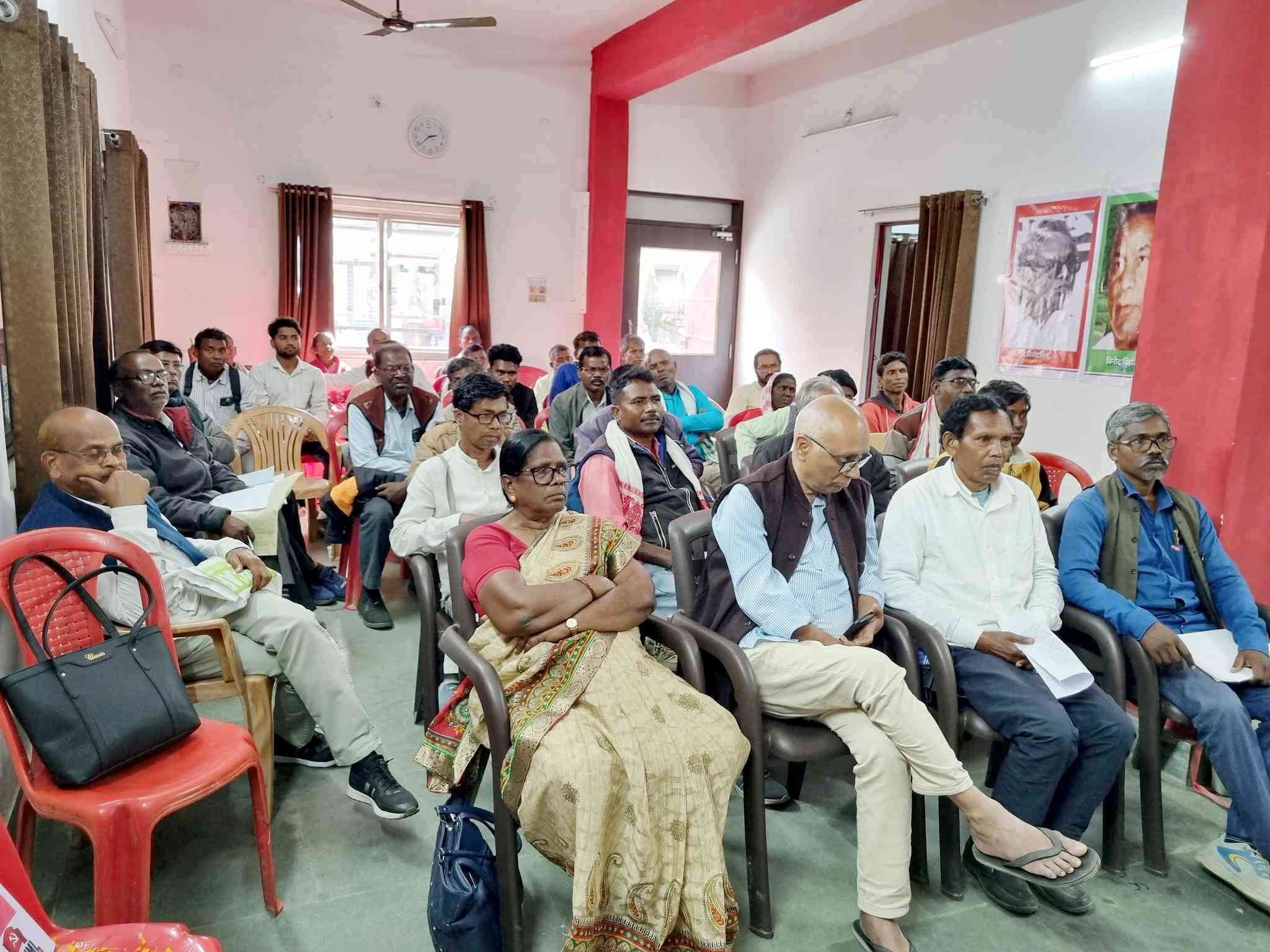Convention on Proposed PESA Rules in Jharkhand

A convention on proposed PESA Rules was organised in Ranchi on 5 February 2025 at Mahendra Singh Bhawan. Jharkhand these days is intensely discussing the revised Rules (originally proposed and made available to public in 2023) for Panchayats (Extension to Scheduled Areas) Act, 1996 (PESA Act). The PESA was enacted in 1996, the Rules for this are yet to be made and implemented in Jharkhand. Odisha is another such state waiting for the framing of rules while rest of the eight states where PESA applies have made their Rules. Now this has become important to understand and make people aware of the ongoing debates regarding the proposed Rules in the context of preserving the autonomy of tribal communities as well as their culture and rights over the Jal-Jangal-Zameen.
The 73rd Constitutional amendment in 1992 led the way for the Panchayati Raj Act. This also raised apprehensions about encroachment on the culture and autonomy of adivasi communities having their own community self-governance traditions. Therefore, to extend Panchayati Raj in Fifth Schedule areas some changes and exceptions were suggested by the parliamentary committee led by Dilip Singh Bhuria. These were incorporated through the enactment of PESA Act 1996. The intention was to protect the traditional self-governance of tribal communities and rights over land, water and forest resources along with maintaining effective control over local markets and institutions. A similar mechanism already exists in the Sixth Schedule areas in the North-East states where elected Autonomous District Councils have been given various administrative and financial powers. PESA actually meant to provide similar rights to Gram Sabhas and Adivasi communities in Fifth Schedule areas in ten states.
Unfortunately, implementation of PESA Act has effectively been turned into a mere ornamental paperwork by the administration and corporate nexus, betraying its fundamental objectives. The rights of adivasis and gram sabha over their land and forest produce are deceitfully, and in many cases forcefully, been trampled betraying PESA in letter and spirit. Adivasis’ forests and lands are being acquisitioned, their legal rights over forest produce not implemented. The implementation of the Act needs a conscious socio-political intervention and adequate resistance against the unwillingness of the government. Even before the implementation of PESA, Jharkhand witnessed manipulations to undermine the rights of gram sabhas, besides inter community conflicts politically engineered by ruling parties’ leaders.
The Gram Sabha is the basic unit enjoying rights under PESA and must be respected by higher bodies like Panchayat or Zilla Parishad. The draft rules proposed by the Jharkhand government more or less talk about continuing traditional adivasi forms in the Gram Sabha, but this actually reflects what was given under the Jharkhand Panchayat Act of 2001. The state has already diluted CNT and SPT acts and the Wilkinson Rules meant to protect tribals, through a land acquisition amendment Act enacted in 2017 and a Land Bank policy made under BJP’s Raghubar Das government. Without scrapping these two latter provisions any talk of empowering gram sabhas and communities in scheduled areas is redundant. The CNT-SPT Act and Wilkinson Rules empower the Deputy Commissioner for taking decisions with respect to the transfer of land. This clearly overrules the rights of Gram Sabha enshrined under PESA. The proposed draft rules do not provide any solution for this, hence defeats the very objective.
Urbanisation is taking place at a fast pace with new industrial areas, cities and towns developing. This has increased the non-adivasi population in Scheduled areas requiring extra measures to be taken to protect village communities and adivasis’ rights. Special provisions are needed to preserve water and other resources and village communities’ control over local markets. The rights over local traditional liquor production and sale should also be protected along with increased women’s participation and monitoring. The draft rules do not address these issues.
The use of police force or private gangs for overtly or covertly suppressing the opinion of gram sabhas in matters of land acquisitions has become the norm. Heavy presence of officials and police at gram sabha meetings is intimidating. The proposed draft rules should have introduced provisions to negate such intimidating situations. Another provision needed is to empower respective village communities in Scheduled and Forest areas to monitor and write preliminary reports to be considered FIR for law and order situations.
This would be highly improper to ignore the demands, message and spirit of the historic Paththalgarhi movement of Jharkhand when formulating rules related with the adivasis in the state. There must be punitive legal provisions for officials violating the tribal area autonomy given under the 5th Schedule of the Constitution. The PESA Act ensures devolution of rights up to the grassroot level hence the simultaneous process of decentralisation and democratisation are inherent in the Act. Any attempt to demean the democratic values and norms would be an attack on the rights of respective communities. This cannot be achieved by merely paying lip service with some pro-adivasi rhetoric while the basic structure remains the same as was in the Jharkhand Panchayat Act of 2001. Moreover, there are attempts to derail the whole subject by diverting it towards the manufactured debate of moolvasi versus adivasi. We must concentrate and focus on achieving the objectives of the PESA Act without undergoing any such useless debates. There cannot be any other way of protecting the interests of moolvasis in the Scheduled areas other than PESA.
The implementation of PESA has already been delayed and the government has accomplished or is in the process of completing so many land acquisitions and MOUs. Many villages are facing displacements. Police atrocities, use of muscle power by corporates is rampant resulting in false criminal cases on villagers and eventual displacements. Any delay in framing rules could prove disastrous, but at the same time leaving space to undermine the Scheduled Area provisions would be more disastrous and unproductive just like 1985 domicile policy.
This demands a united people’s intervention in order to achieve effective PESA implementation, which also requires tweaking in some other related Acts as discussed above. The Jharkhand government must listen to the elected people’s representatives as well as representatives of rights organisations and adivasi movements in Scheduled areas, along with subject matter specialists and competent administrative officials and include their opinions in the final draft rules and implement them within a time frame of maximum six months.
The convention began after paying tributes to CPIML leaders Vinod Lahari, who passed away recently, and Srilata Swaminathan on her 8th death anniversary. This was attended by more than 70 activists from many districts of Jharkhand including Ranchi, Hazaribagh, Ramgarh, Dumka, Jamtara, Palamou, Garhwa, Latehar, Bokaro and Gumla. CPIML state secretary Manoj Bhakt was among the speakers along with Nita Bedia, Alma Khalko, Kamlesh Singh Chero, RD Manjhi, Santosh Munda, Bunda Baske, and Dhaneshwar Kharwar. The proceedings were conducted by Gautam Munda. Devkinandan Bedia, Jagarnath Oraon, Sushila Tigga, Sukdev Munda, Sudama Khalko, Anjala Tigga, Nageshwar Munda, Manaram Manjhi, Ramchandra Oraon, Siraj Dutta, Aitee Tirki, Shanti Sen and many others also shared their views on the drawbacks of proposed rules in the convention.
The Convention resolved to launch a mass campaign from 8-20 February throughout the state to culminate in a mass mobilisation in Ranchi on 21 February where a demand charter would be handed over to the Chief Minister.

Charu Bhawan, U-90, Shakarpur, Delhi 110092
Phone: +91-11-42785864 | +91 9717274961 E-mail: info@cpiml.org

